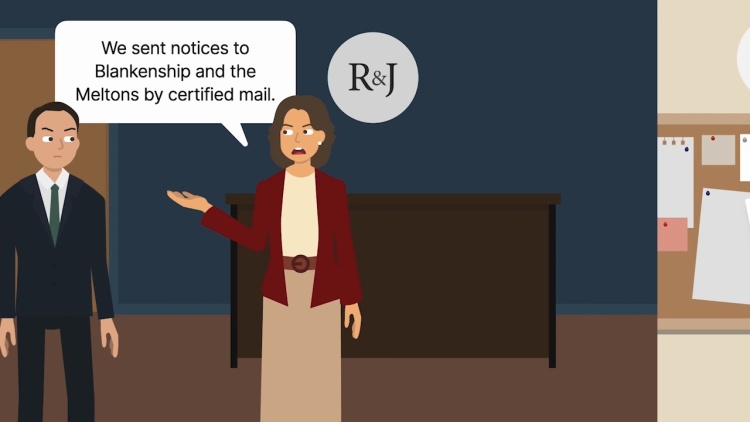R & J of Tennessee, Inc. v. Blankenship-Melton Real Estate, Inc.
Tennessee Court of Appeals
166 S.W.3d 195 (2004)
- Written by DeAnna Swearingen, LLM
Facts
Blankenship-Melton Real Estate, Inc. (BM) (defendant) took out a loan from the Bank of Henderson (Bank). BM gave the Bank a security interest in a boat, tractor, truck, and mobile home. Walden Blankenship, guaranteed the note, as did Steve Melton (Steve), and his father, Larry. The loan was extended twice before BM defaulted. The Bank initiated foreclosure proceedings. Johnny Melton (Johnny), as president and majority shareholder of R & J of Tennessee, Inc. (R&J) (plaintiff), bought the note. R&J took no action for seven months, while Steve lived in the trailer, and Larry used the truck. No rent was paid for use of the collateral. R&J initiated foreclosure proceedings. Notice was sent to Blankenship at the address listed on the guaranty, but Blankenship had moved. Two delivery attempts were made, but R&J went forward without confirmation. After the sale, the letter was returned undeliverable. R&J posted notices of the sale at its office, the courthouse, and on the collateral. Only Larry and Johnny attended the sale, and Johnny was the only bidder. R&J sued Blankenship for the deficiency. Blankenship won in the general sessions court, but the circuit court tried the case de novo and found for R&J. Blankenship appealed to the Court of Appeals of Tennessee, challenging the sufficiency of the notice and the commercial reasonableness of the sale.
Rule of Law
Issue
Holding and Reasoning (Highers, J.)
What to do next…
Here's why 907,000 law students have relied on our case briefs:
- Written by law professors and practitioners, not other law students. 47,100 briefs, keyed to 996 casebooks. Top-notch customer support.
- The right amount of information, includes the facts, issues, rule of law, holding and reasoning, and any concurrences and dissents.
- Access in your classes, works on your mobile and tablet. Massive library of related video lessons and high quality multiple-choice questions.
- Easy to use, uniform format for every case brief. Written in plain English, not in legalese. Our briefs summarize and simplify; they don’t just repeat the court’s language.





